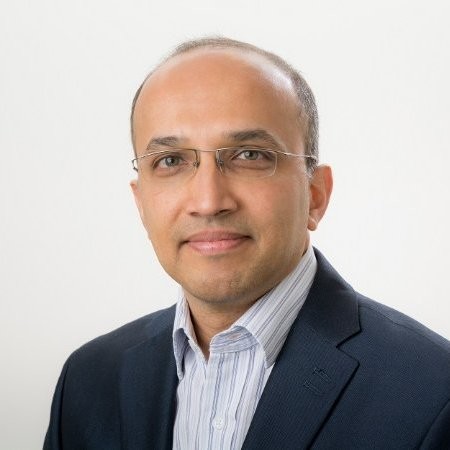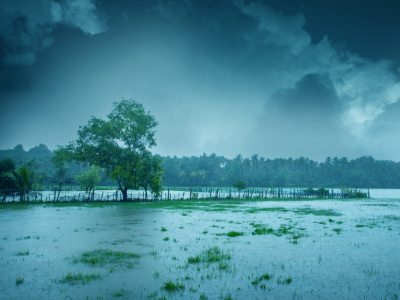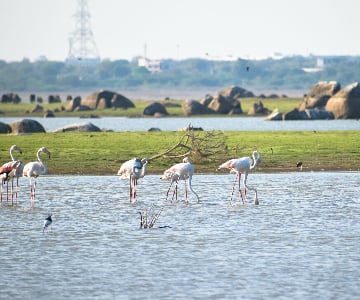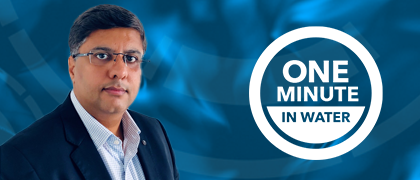Partnering to Solve Water in India
Partnership is core to how Xylem operates and to our work to solve water in India.
To solve the world’s biggest water challenges, you need partners who share a vision and are willing to push boundaries to make a difference. Making Waves recently spoke with Nitin Bhate, Managing Director, Xylem India, who leads Xylem’s operations in the country, about the partnerships that are shaping and transforming India’s water infrastructure.
What are the biggest water challenges that you see today in India?
Like the world over, India is facing chronic water challenges driven by population growth and climate change. When you think of size alone, India has over 17% of the entire world’s population - that’s a lot of people who need safe access to water. Unfortunately, India only holds about 4% of the world’s freshwater resources.
This gap between water supply and population size means that about half of the people in India are impacted by water scarcity.
This is a colossal challenge, but one that we can address with the right thinking, technology and partnerships. The actions we are taking now together will help transform the infrastructure of water in India for years to come and directly enhance the lives of people and communities.
 Why is partnering so important to drive innovation and help solve these challenges?
Why is partnering so important to drive innovation and help solve these challenges?
To solve challenges this big a new approach is required, we need to embrace innovation and think differently. No one company or organization will be able to tackle these challenges – we will truly need an ecosystem approach. True partnerships are critical to doing just that, they bring an exchange of ideas and perspectives that can unlock new ways of thinking and approaches. We see this again and again, as we co-create with our research and technology partners at our technology centers and work with our customers solving water challenges in their communities. What has been hugely impactful and meaningful from a Xylem perspective is the depth and variety of partnerships we’re forming; be it with customers, academics, innovators, industry leaders and of course people in the communities themselves.
What kind of human impact are our partnerships having?
Probably the most rewarding element of my role is seeing the phenomenal impact our partnerships are having on communities across India,
whether it’s securing access to water, improving wastewater treatment, mitigating the impact of flooding or creating transformative new irrigation solutions, together with our customers we’re changing lives.
One such project is the Kaleshwaram Lift Irrigation Scheme (KLIS) which is one of the biggest multistage lift irrigation projects in the world. Built over the Godavari River in Kaleshwaram, Bhupalpally, Telangana, this transformational project was developed to harness the flood waters of the river and make Telangana more resilient to withstanding droughts; helping to resolve water scarcity issues in the adjoining and drought-prone districts of Telangana and utilizing water for irrigation, drinking and industrial use for millions of people.

At Xylem, we have the opportunity to make a difference through both our work with our public and private sector customers, and through our humanitarian assistance efforts and partnerships. For example, we have developed a culture of volunteering that is having a lasting impact not just on our communities but also our people. In the past few years, we’ve deepened our relationships with many outstanding NGOs such as Planet Water Foundation, SERAPHS and others through Xylem Watermark, Xylem's corporate social responsibility program. We’re not only providing them with financial support we’re putting in place short- and long-term solutions to protect access to safe drinking water, and co-developing pioneering sanitation and hygiene education programs for children in schools and communities right across India. Earlier this year, we also announced a partnership with Mumbai City Football Club to raise public awareness and engagement around water challenges.
With more and more communities under threat from natural disasters, we’re working with local government and community stakeholders to build resilience through advance preparation. We’re also deploying teams to secure continuity of basic services and mitigate the effects of devastating floods like those in Kerala. Here again, we are partnering with our customers and humanitarian organizations to make a difference. We’ve achieved a great deal here, but we know there’s more work to do and our team remain committed to doing what we can to alleviate the hardships caused by such events.
How excited are you about the future of further optimizing the water infrastructure in India?
I’ve never felt more optimistic about our ability to tackle the water challenges that India faces. Now more than ever before there is strong momentum and political will to transform our infrastructure. From a governmental level, water is now a priority sector in development plans, and that’s unlocking critical investment for the modernization of water systems across the country.
We are seeing huge ambition and some of the boldest water innovations anywhere in the world are now happening in India.
It has been incredible to see the powerful impact we can have working together to address a common goal and being part of the progress is one of the greatest honors of my life.
What’s your biggest learning in how to build great partnerships?
Great partnerships have to be built on trust, it’s the glue that makes everything work. To build that trust from a technology provider’s point of view, you have to earn it – every day. You have to bring commitment and integrity to everything you do and work together with your partners to co-create and solve the problems they face. You have to listen and truly understand your partner’s needs, and when you do, you can have a transformative impact on communities they serve.
Solving Water Spotlight:
Tackling wastewater challenges for more resilient, healthy communities
 In the city of Jamnagar, Gujarat, sewage was being transferred through open drains, causing unhealthy conditions and water logging, which was contaminating drinking water. This untreated sewage from the city was being discharged into the Rangmati and Nagmati rivers, which meet the sea of the Gulf of Kutch, causing a threat to marine and other biological life, including the Bird Sanctuary at Khijadia, and other environmental challenges.
In the city of Jamnagar, Gujarat, sewage was being transferred through open drains, causing unhealthy conditions and water logging, which was contaminating drinking water. This untreated sewage from the city was being discharged into the Rangmati and Nagmati rivers, which meet the sea of the Gulf of Kutch, causing a threat to marine and other biological life, including the Bird Sanctuary at Khijadia, and other environmental challenges.
Essar Projects Ltd and Thermax Joint JV took on the task of solving these issues on behalf of the city, and in doing so constructed a 70 million liters per day (MLD) sewage treatment plant (STP), along with taking on operations of the plant for 15 years. Essar partnered with Xylem to enable Intermittent Cycle Extended Aeration Solution (ICEAS), which is an advanced sequencing batch reactor (SBR) technology for municipal and industrial wastewater treatment, providing significant advantages in terms of reduced footprint, reliable and robust controls, and low capital, operation and maintenance costs. The ICEAS full-process solution integration provides many advantages, including aeration systems, blowers, pumps, mixers, and monitoring and control.
By deploying Xylem’s Sanitaire ICEAS, the city of Jamnagar is now able to treat sewage to prepare it for reuse in surrounding industries, and the discharge of treated effluent is no longer a concern for the surrounding marine ecosystems.
This is improving community health, as well as the water quality of the Rangmati and Nagmati rivers, which in turn improves riverfront areas and saves freshwater resources.
Learn more about how Xylem is working with our customers in India to mitigate their communities toughest water challenges.
More on our Power of Partnering series



